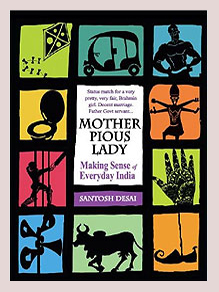 When I began reading Mother Pious Lady, written by Santosh Desai – at easy length, I saw in it my yesteryears – remembering my childhood, youth and now my present days. The first of value is that as an Indian, I can do so. Too deeply rooted with my own roots, the book depicts innumerable settings that have been an integral part of my world. I would recommend for the Indian readers, in particular, to dot their memories with Mother Pious Lady. The content is analytically very adequate, supported with extraordinary sense of humour. Beyond question, the author shows constantly signs of integrity, while comparing earlier times how Indian society was, and what it is fifty or sixty years, later.
When I began reading Mother Pious Lady, written by Santosh Desai – at easy length, I saw in it my yesteryears – remembering my childhood, youth and now my present days. The first of value is that as an Indian, I can do so. Too deeply rooted with my own roots, the book depicts innumerable settings that have been an integral part of my world. I would recommend for the Indian readers, in particular, to dot their memories with Mother Pious Lady. The content is analytically very adequate, supported with extraordinary sense of humour. Beyond question, the author shows constantly signs of integrity, while comparing earlier times how Indian society was, and what it is fifty or sixty years, later.
Forwarding concrete images related to the ‘changed times’ and ‘changing times’, whether India is still leaning towards its traditional ways of living or not: the mother, a wife, a daughter-in-law are today surely in a different arena, residing with their respective spouses, riding on a new wave. In another context, through Desai, we are able to value a prolonged scrutiny to review in sequence what India is gaining, losing in her functioning forms.
I would venture to say that Mother Pious Lady could make an impressive evidence for non-Indians, as well. From a positive argument, Indians will remain less as strangers, with the kind of writing Desai has published, leaving a kind of philosophy. In a popular sense, there is also a high chance, out of sheer curiosity, the book will seal some of the internationally long-faced gaps between India and countries of other origins. While making practical use of his research, the author has made a practical offering to his readers by interviewing India in her different aspects of evolving circumstances. He cuts through the chapters of Suburban Escape with the same relevant effects of explanation as he describes The Power of Inflation.
Desai writes extensively on media, popular culture, consumer markets and everyday life. He is a graduate in Economics and a postgraduate in Management from the Indian Institute of Management, Ahmedabad. Well-pronounced, his book Mother Pious Lady is Making Sense of Everyday India!
I will agree at once when people say Mother Pious Lady is worth reading.